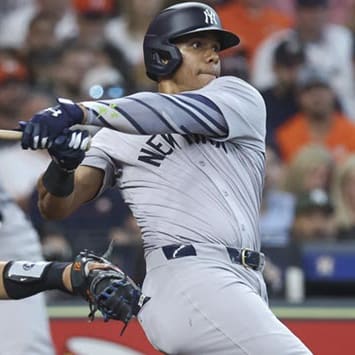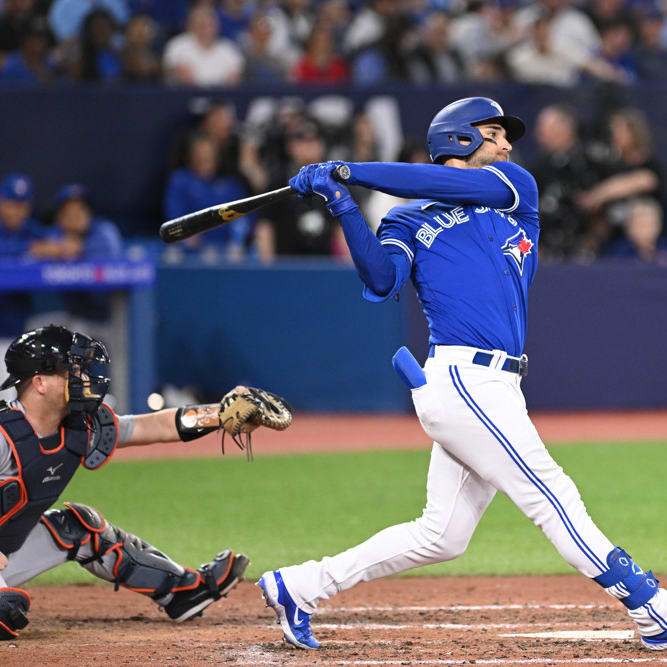This article is part of our The Saber's Edge series.
Mike Trout may not be the consensus No. 1 fantasy player, but he is, on average, the top player taken this draft season. He has been the top position player the last few seasons. Jayson Werth has been far from a sought-after player, and his ADP is 286 according to NFBC. I am pretty sure most owners would not considering replacing Trout with Werth anytime during a season, but it is a viable option.
The following analysis is for teams with daily lineup changes. If you only play in leagues with weekly lineups, sorry no help here. With weekly lineups, the following analysis doesn't hold up since each hitter is expected to face a wider range of pitching talents. Also, some leagues a limit on the number of daily lineup changes in a week. In these instances, the owner will need to make informed decision on when to change his lineup.
Truthfully, the title of this article and first paragraph are a little misleading. The key isn't comparing Trout to Werth. The key is to determine when to sit Trout depending on the pitcher he is facing. This realization came to me when another league owner stated, "I never start any hitter against Kershaw ... ever. I always have a better option on my bench." We are in a deeper league with 15 bench options (which can include minor leaguers) so several options usually exist. Is there a situation when a replacement-level fantasy player is good play over the best
Mike Trout may not be the consensus No. 1 fantasy player, but he is, on average, the top player taken this draft season. He has been the top position player the last few seasons. Jayson Werth has been far from a sought-after player, and his ADP is 286 according to NFBC. I am pretty sure most owners would not considering replacing Trout with Werth anytime during a season, but it is a viable option.
The following analysis is for teams with daily lineup changes. If you only play in leagues with weekly lineups, sorry no help here. With weekly lineups, the following analysis doesn't hold up since each hitter is expected to face a wider range of pitching talents. Also, some leagues a limit on the number of daily lineup changes in a week. In these instances, the owner will need to make informed decision on when to change his lineup.
Truthfully, the title of this article and first paragraph are a little misleading. The key isn't comparing Trout to Werth. The key is to determine when to sit Trout depending on the pitcher he is facing. This realization came to me when another league owner stated, "I never start any hitter against Kershaw ... ever. I always have a better option on my bench." We are in a deeper league with 15 bench options (which can include minor leaguers) so several options usually exist. Is there a situation when a replacement-level fantasy player is good play over the best fantasy hitter?
For some owners, they paid top dollar for Trout and are not going to sit him for Werth under any circumstance. If you are one of those owners, I would encourage you to read on. I was one of those owners, but I have found every small advantage is needed as the rest of my competition gets smarter.
To help show this, go to Example No. 1 in this spreadsheet in Google Sheets and download it. For this example, I used the projected batting average (pitcher AVG are available at FanGraphs) for Mike Trout vs Clayton Kershaw and Jayson Werth vs. Bartolo Colon. Besides the rates for each player, the league wide average needs to be included. I have inserted all the values.
While Trout is about a .300 hitter, Kershaw is quite a bit better than league average. Theoretically, if Trout only faces Kershaw, he would be near a .236 hitter for the season using the calculations. If Jayson Werth is to face Bartolo Colon, he should expect his batting average to jump from an expected .244 to .260. In this example, Trout moves from having a 50-point advantage in batting to a 14-point deficit.
I can already hear you screaming from your computer that there is more to a player than just average, and I agree 100 percent. A person can go through each of the category stats and make an overall comparison. The counting categories need to be converted to rate stats. Hitters need to have the stat per plate appearance and pitchers need to have it per batters faced. Truthfully, finding each stat is a little unruly, and then combining them is even more of a mess. Instead, I use a process a little more complex than just getting batting average, but a whole lot easier than finding where the players' stand on each single stat. Enter wOBA.
Weighted on-base percentage (wOBA) is a great measure of a player's overall hitting talent. The stat is on the on-base percentage scale, but each event is weighted depending on the historical number of runs generated. It is one of the best catch-all stats to show a hitter's talent.
Another great feature of wOBA is that it also can be calculated for pitchers because they give up the stats. The problem is that no website tracks pitcher wOBA in any form. Instead, I have reversed engineered pitcher ERA to project wOBA. All a person needs now is a player's wOBA and a pitcher's ERA to see if the pitcher has too much talent and the hitter must sit.
If you go to the Example No. 2 on the spreadsheet, you find Werth just a bit better than Trout, but not by nearly as much compared to the AVG comparison. In cases where the players are the same, I would lean toward the hitter facing the worse pitcher. It is not just Trout facing the Kershaw, it is the rest of his team. On average, half the runs (and therefore RBI) are available against Kershaw than Colon. Even if Werth and Trout perform the same, Werth's production is more likely to lead to more counting stats.
Even though I show an example for a single day, I rarely make comparisons every single day. Instead, I go through each position option and find the instances where I would choose the inferior hitter before the season starts. With the case of Trout and Werth, Trout's opponent needs to be about two runs worse than Werth. This can be done by entering different ERA values until the projected wOBA values are the same. With this information, you have a good idea of the spread in talent needed to consider picking Trout over Werth.
When initially using this procedure, the calculations may take a little time figuring out the how much spread there needs to be in talent between pitchers. After a week or two it becomes easier to notice when to make the switch as you notice the bad pitchers to hit against and the stud pitchers to avoid. Also, don't give up on the procedure if it doesn't work the first few times. Over the course of the season, the numbers will work. Looking over Trout in 2015, he faced 26 pitchers that I would call aces. In those 26 games he hit .219/.327/.417 with 1.1 R+RBI per game. In the rest of the games he hit .314/.415/.622 with 1.8 R+RBI per game. Winning fantasy teams don't start players with a .219 AVG. and a sub-100 ISO. For player worse than Trout, the downgrade is even bigger when they face great pitching.
I know this is quite a bit of math; feel free to ask any questions to help clear up any confusion. The key takeaway is that no matter how well a hitter performs, an owner should expect to sit him against certain pitchers if the league allows daily transactions. The problem is that top hitters can perform like AAAA players against the league's aces. Staying away from these aces should be an owner's No. 1 goal.










